Argumentative Essay on the Ethics of Animal Testing
VerifiedAdded on 2023/05/28
|5
|1270
|310
Essay
AI Summary
This argumentative essay presents a strong case against animal testing, arguing that it is unethical and archaic. The essay begins by stating the core argument: animal testing should be banned due to its inherent cruelty and the infliction of pain on sentient beings. It then supports this claim with evidence, including the high failure rate of drugs tested on animals that do not translate to humans. The essay addresses counterarguments, acknowledging that some believe animal testing benefits both humans and animals, particularly in medical advancements. However, the essay refutes these points by highlighting the availability of modern, humane alternatives, such as human-based microdosing, in vitro technology, and computer modeling, which are often more accurate and cost-effective. Furthermore, the essay emphasizes the unethical nature of subjecting animals to extreme pain and suffering, including barbaric tests. The conclusion reiterates the call for a ban on animal testing, asserting that humans do not have the right to harm other living beings. The essay is supported by cited research from various sources.
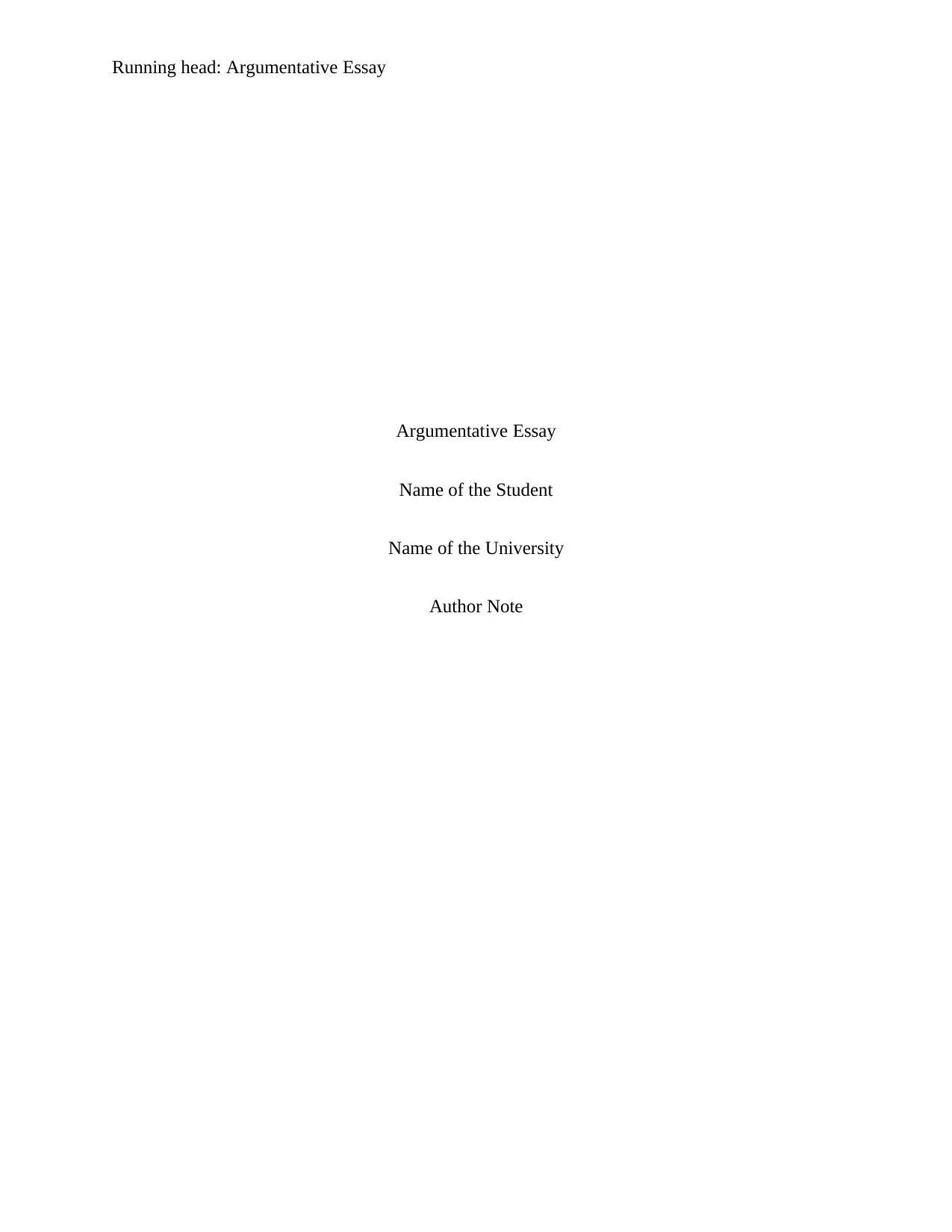
Running head: Argumentative Essay
Argumentative Essay
Name of the Student
Name of the University
Author Note
Argumentative Essay
Name of the Student
Name of the University
Author Note
Paraphrase This Document
Need a fresh take? Get an instant paraphrase of this document with our AI Paraphraser
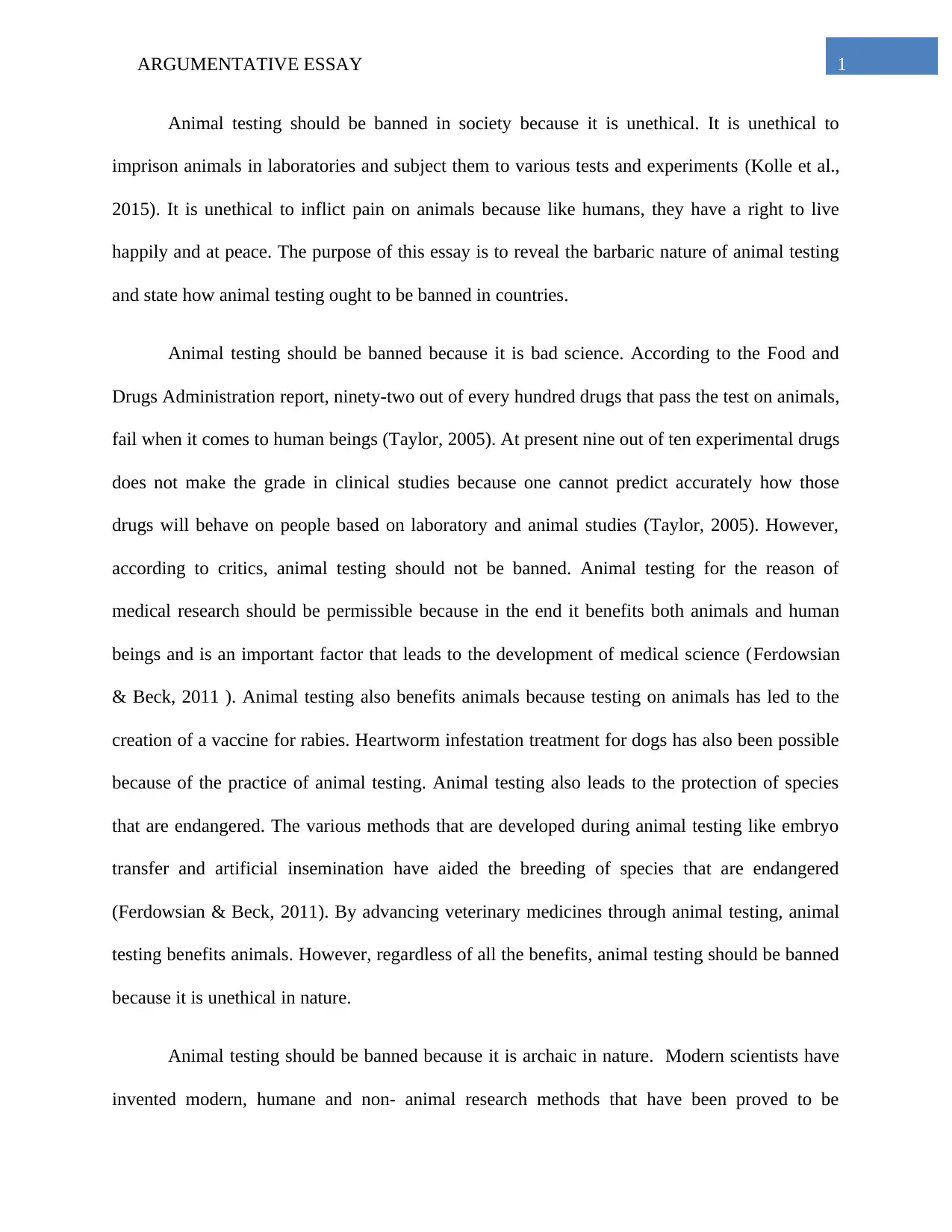
1ARGUMENTATIVE ESSAY
Animal testing should be banned in society because it is unethical. It is unethical to
imprison animals in laboratories and subject them to various tests and experiments (Kolle et al.,
2015). It is unethical to inflict pain on animals because like humans, they have a right to live
happily and at peace. The purpose of this essay is to reveal the barbaric nature of animal testing
and state how animal testing ought to be banned in countries.
Animal testing should be banned because it is bad science. According to the Food and
Drugs Administration report, ninety-two out of every hundred drugs that pass the test on animals,
fail when it comes to human beings (Taylor, 2005). At present nine out of ten experimental drugs
does not make the grade in clinical studies because one cannot predict accurately how those
drugs will behave on people based on laboratory and animal studies (Taylor, 2005). However,
according to critics, animal testing should not be banned. Animal testing for the reason of
medical research should be permissible because in the end it benefits both animals and human
beings and is an important factor that leads to the development of medical science (Ferdowsian
& Beck, 2011 ). Animal testing also benefits animals because testing on animals has led to the
creation of a vaccine for rabies. Heartworm infestation treatment for dogs has also been possible
because of the practice of animal testing. Animal testing also leads to the protection of species
that are endangered. The various methods that are developed during animal testing like embryo
transfer and artificial insemination have aided the breeding of species that are endangered
(Ferdowsian & Beck, 2011). By advancing veterinary medicines through animal testing, animal
testing benefits animals. However, regardless of all the benefits, animal testing should be banned
because it is unethical in nature.
Animal testing should be banned because it is archaic in nature. Modern scientists have
invented modern, humane and non- animal research methods that have been proved to be
Animal testing should be banned in society because it is unethical. It is unethical to
imprison animals in laboratories and subject them to various tests and experiments (Kolle et al.,
2015). It is unethical to inflict pain on animals because like humans, they have a right to live
happily and at peace. The purpose of this essay is to reveal the barbaric nature of animal testing
and state how animal testing ought to be banned in countries.
Animal testing should be banned because it is bad science. According to the Food and
Drugs Administration report, ninety-two out of every hundred drugs that pass the test on animals,
fail when it comes to human beings (Taylor, 2005). At present nine out of ten experimental drugs
does not make the grade in clinical studies because one cannot predict accurately how those
drugs will behave on people based on laboratory and animal studies (Taylor, 2005). However,
according to critics, animal testing should not be banned. Animal testing for the reason of
medical research should be permissible because in the end it benefits both animals and human
beings and is an important factor that leads to the development of medical science (Ferdowsian
& Beck, 2011 ). Animal testing also benefits animals because testing on animals has led to the
creation of a vaccine for rabies. Heartworm infestation treatment for dogs has also been possible
because of the practice of animal testing. Animal testing also leads to the protection of species
that are endangered. The various methods that are developed during animal testing like embryo
transfer and artificial insemination have aided the breeding of species that are endangered
(Ferdowsian & Beck, 2011). By advancing veterinary medicines through animal testing, animal
testing benefits animals. However, regardless of all the benefits, animal testing should be banned
because it is unethical in nature.
Animal testing should be banned because it is archaic in nature. Modern scientists have
invented modern, humane and non- animal research methods that have been proved to be
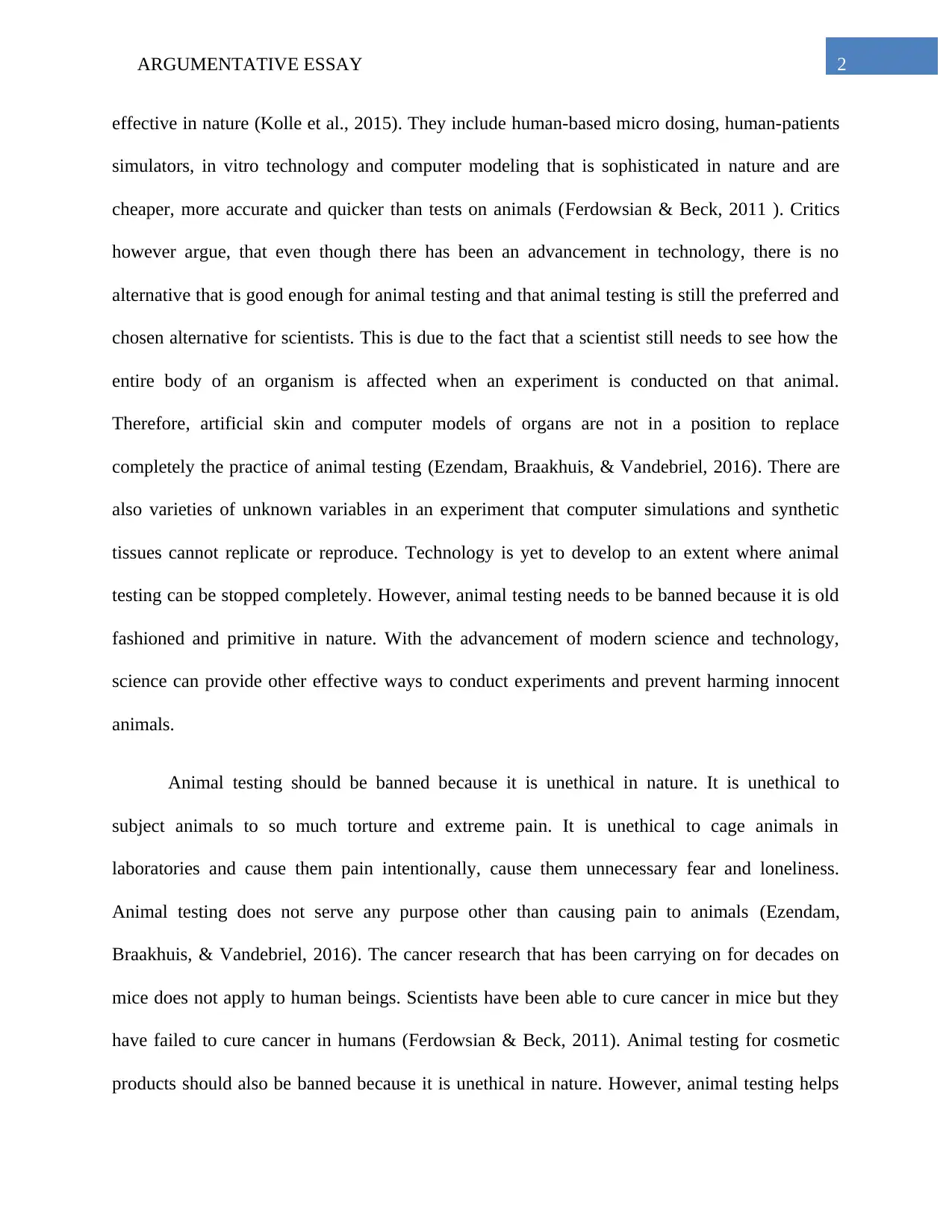
2ARGUMENTATIVE ESSAY
effective in nature (Kolle et al., 2015). They include human-based micro dosing, human-patients
simulators, in vitro technology and computer modeling that is sophisticated in nature and are
cheaper, more accurate and quicker than tests on animals (Ferdowsian & Beck, 2011 ). Critics
however argue, that even though there has been an advancement in technology, there is no
alternative that is good enough for animal testing and that animal testing is still the preferred and
chosen alternative for scientists. This is due to the fact that a scientist still needs to see how the
entire body of an organism is affected when an experiment is conducted on that animal.
Therefore, artificial skin and computer models of organs are not in a position to replace
completely the practice of animal testing (Ezendam, Braakhuis, & Vandebriel, 2016). There are
also varieties of unknown variables in an experiment that computer simulations and synthetic
tissues cannot replicate or reproduce. Technology is yet to develop to an extent where animal
testing can be stopped completely. However, animal testing needs to be banned because it is old
fashioned and primitive in nature. With the advancement of modern science and technology,
science can provide other effective ways to conduct experiments and prevent harming innocent
animals.
Animal testing should be banned because it is unethical in nature. It is unethical to
subject animals to so much torture and extreme pain. It is unethical to cage animals in
laboratories and cause them pain intentionally, cause them unnecessary fear and loneliness.
Animal testing does not serve any purpose other than causing pain to animals (Ezendam,
Braakhuis, & Vandebriel, 2016). The cancer research that has been carrying on for decades on
mice does not apply to human beings. Scientists have been able to cure cancer in mice but they
have failed to cure cancer in humans (Ferdowsian & Beck, 2011). Animal testing for cosmetic
products should also be banned because it is unethical in nature. However, animal testing helps
effective in nature (Kolle et al., 2015). They include human-based micro dosing, human-patients
simulators, in vitro technology and computer modeling that is sophisticated in nature and are
cheaper, more accurate and quicker than tests on animals (Ferdowsian & Beck, 2011 ). Critics
however argue, that even though there has been an advancement in technology, there is no
alternative that is good enough for animal testing and that animal testing is still the preferred and
chosen alternative for scientists. This is due to the fact that a scientist still needs to see how the
entire body of an organism is affected when an experiment is conducted on that animal.
Therefore, artificial skin and computer models of organs are not in a position to replace
completely the practice of animal testing (Ezendam, Braakhuis, & Vandebriel, 2016). There are
also varieties of unknown variables in an experiment that computer simulations and synthetic
tissues cannot replicate or reproduce. Technology is yet to develop to an extent where animal
testing can be stopped completely. However, animal testing needs to be banned because it is old
fashioned and primitive in nature. With the advancement of modern science and technology,
science can provide other effective ways to conduct experiments and prevent harming innocent
animals.
Animal testing should be banned because it is unethical in nature. It is unethical to
subject animals to so much torture and extreme pain. It is unethical to cage animals in
laboratories and cause them pain intentionally, cause them unnecessary fear and loneliness.
Animal testing does not serve any purpose other than causing pain to animals (Ezendam,
Braakhuis, & Vandebriel, 2016). The cancer research that has been carrying on for decades on
mice does not apply to human beings. Scientists have been able to cure cancer in mice but they
have failed to cure cancer in humans (Ferdowsian & Beck, 2011). Animal testing for cosmetic
products should also be banned because it is unethical in nature. However, animal testing helps
⊘ This is a preview!⊘
Do you want full access?
Subscribe today to unlock all pages.

Trusted by 1+ million students worldwide
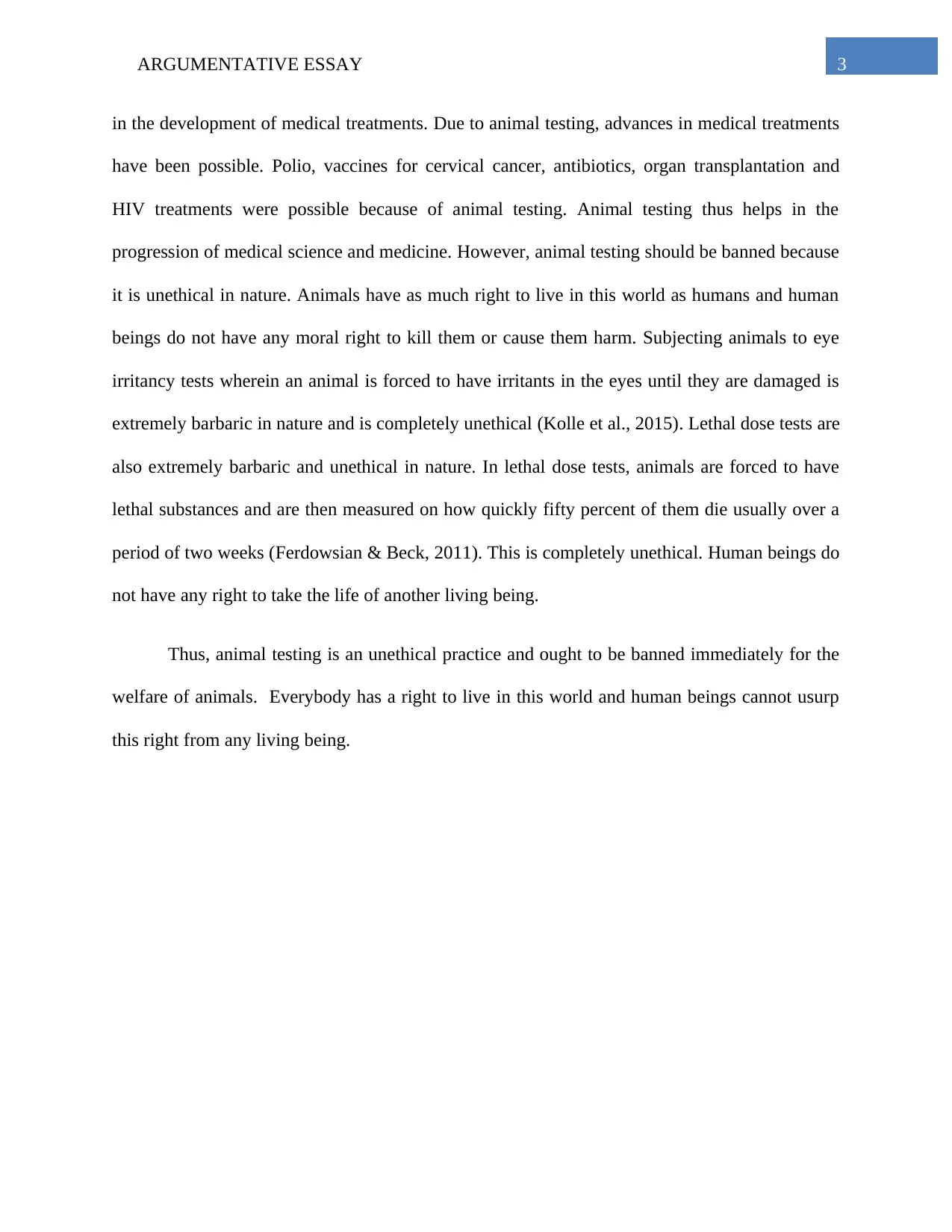
3ARGUMENTATIVE ESSAY
in the development of medical treatments. Due to animal testing, advances in medical treatments
have been possible. Polio, vaccines for cervical cancer, antibiotics, organ transplantation and
HIV treatments were possible because of animal testing. Animal testing thus helps in the
progression of medical science and medicine. However, animal testing should be banned because
it is unethical in nature. Animals have as much right to live in this world as humans and human
beings do not have any moral right to kill them or cause them harm. Subjecting animals to eye
irritancy tests wherein an animal is forced to have irritants in the eyes until they are damaged is
extremely barbaric in nature and is completely unethical (Kolle et al., 2015). Lethal dose tests are
also extremely barbaric and unethical in nature. In lethal dose tests, animals are forced to have
lethal substances and are then measured on how quickly fifty percent of them die usually over a
period of two weeks (Ferdowsian & Beck, 2011). This is completely unethical. Human beings do
not have any right to take the life of another living being.
Thus, animal testing is an unethical practice and ought to be banned immediately for the
welfare of animals. Everybody has a right to live in this world and human beings cannot usurp
this right from any living being.
in the development of medical treatments. Due to animal testing, advances in medical treatments
have been possible. Polio, vaccines for cervical cancer, antibiotics, organ transplantation and
HIV treatments were possible because of animal testing. Animal testing thus helps in the
progression of medical science and medicine. However, animal testing should be banned because
it is unethical in nature. Animals have as much right to live in this world as humans and human
beings do not have any moral right to kill them or cause them harm. Subjecting animals to eye
irritancy tests wherein an animal is forced to have irritants in the eyes until they are damaged is
extremely barbaric in nature and is completely unethical (Kolle et al., 2015). Lethal dose tests are
also extremely barbaric and unethical in nature. In lethal dose tests, animals are forced to have
lethal substances and are then measured on how quickly fifty percent of them die usually over a
period of two weeks (Ferdowsian & Beck, 2011). This is completely unethical. Human beings do
not have any right to take the life of another living being.
Thus, animal testing is an unethical practice and ought to be banned immediately for the
welfare of animals. Everybody has a right to live in this world and human beings cannot usurp
this right from any living being.
Paraphrase This Document
Need a fresh take? Get an instant paraphrase of this document with our AI Paraphraser
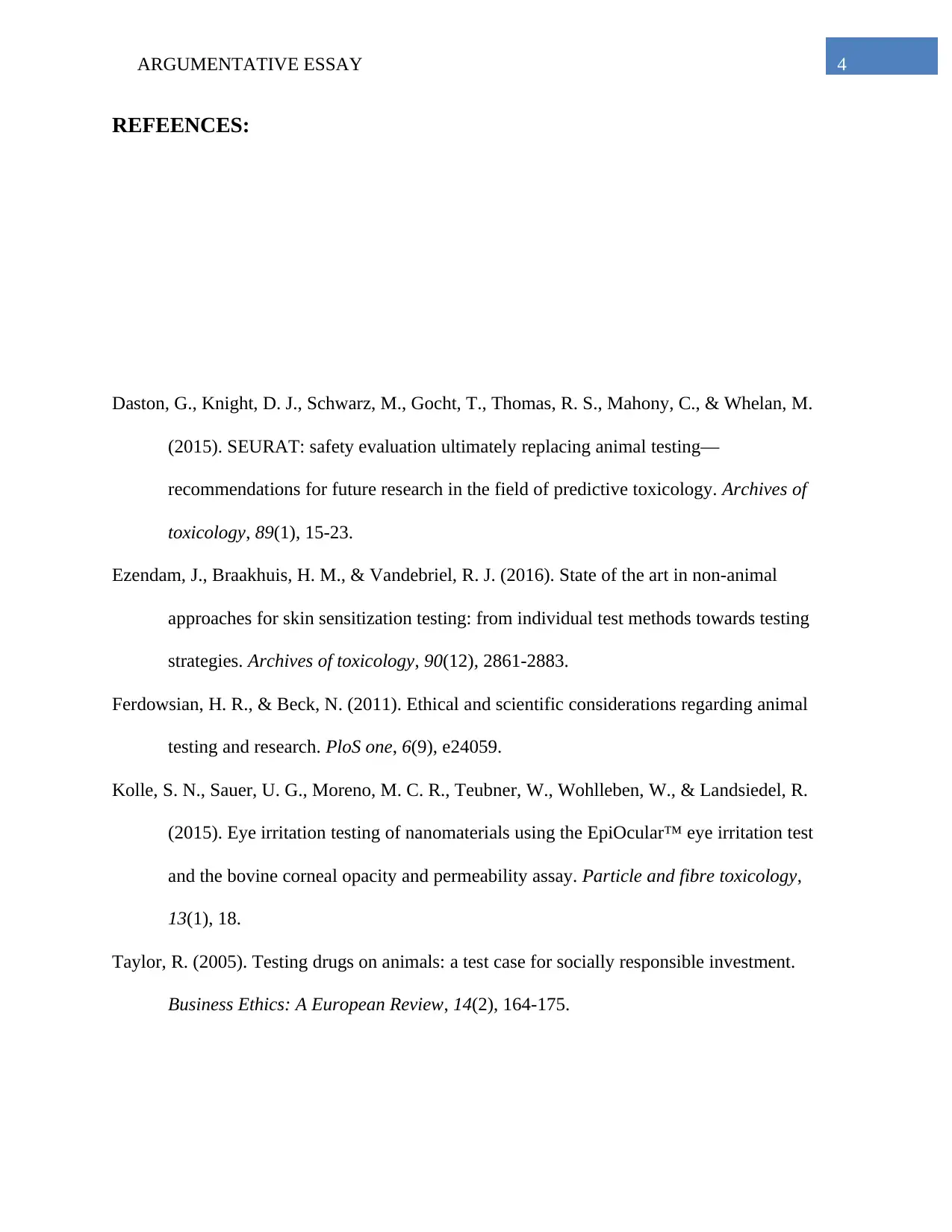
4ARGUMENTATIVE ESSAY
REFEENCES:
Daston, G., Knight, D. J., Schwarz, M., Gocht, T., Thomas, R. S., Mahony, C., & Whelan, M.
(2015). SEURAT: safety evaluation ultimately replacing animal testing—
recommendations for future research in the field of predictive toxicology. Archives of
toxicology, 89(1), 15-23.
Ezendam, J., Braakhuis, H. M., & Vandebriel, R. J. (2016). State of the art in non-animal
approaches for skin sensitization testing: from individual test methods towards testing
strategies. Archives of toxicology, 90(12), 2861-2883.
Ferdowsian, H. R., & Beck, N. (2011). Ethical and scientific considerations regarding animal
testing and research. PloS one, 6(9), e24059.
Kolle, S. N., Sauer, U. G., Moreno, M. C. R., Teubner, W., Wohlleben, W., & Landsiedel, R.
(2015). Eye irritation testing of nanomaterials using the EpiOcular™ eye irritation test
and the bovine corneal opacity and permeability assay. Particle and fibre toxicology,
13(1), 18.
Taylor, R. (2005). Testing drugs on animals: a test case for socially responsible investment.
Business Ethics: A European Review, 14(2), 164-175.
REFEENCES:
Daston, G., Knight, D. J., Schwarz, M., Gocht, T., Thomas, R. S., Mahony, C., & Whelan, M.
(2015). SEURAT: safety evaluation ultimately replacing animal testing—
recommendations for future research in the field of predictive toxicology. Archives of
toxicology, 89(1), 15-23.
Ezendam, J., Braakhuis, H. M., & Vandebriel, R. J. (2016). State of the art in non-animal
approaches for skin sensitization testing: from individual test methods towards testing
strategies. Archives of toxicology, 90(12), 2861-2883.
Ferdowsian, H. R., & Beck, N. (2011). Ethical and scientific considerations regarding animal
testing and research. PloS one, 6(9), e24059.
Kolle, S. N., Sauer, U. G., Moreno, M. C. R., Teubner, W., Wohlleben, W., & Landsiedel, R.
(2015). Eye irritation testing of nanomaterials using the EpiOcular™ eye irritation test
and the bovine corneal opacity and permeability assay. Particle and fibre toxicology,
13(1), 18.
Taylor, R. (2005). Testing drugs on animals: a test case for socially responsible investment.
Business Ethics: A European Review, 14(2), 164-175.
1 out of 5
Your All-in-One AI-Powered Toolkit for Academic Success.
+13062052269
info@desklib.com
Available 24*7 on WhatsApp / Email
![[object Object]](/_next/static/media/star-bottom.7253800d.svg)
Unlock your academic potential
Copyright © 2020–2026 A2Z Services. All Rights Reserved. Developed and managed by ZUCOL.

